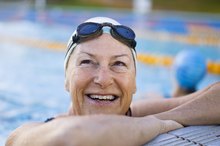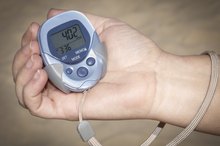Does Losing Body Weight Make Me Swim Faster?
Distance runners develop lean physiques to improve their run times, but the same relationship doesn't always hold true for swimmers, whose bodies do not have to work against gravity. However, weight gain affects your buoyancy, your stamina and your profile as you move through the water, so it can affect your swim speed in unpredictable ways.
Body Shape
Unlike aquatic creatures whose bodies move through water with a minimum of resistance, human bodies are built for bipedal travel on land. In the water, swimmers rely on streamlined suits and proper form to shave another few hundredths of a second from their times. Your physique can also give you a natural advantage in water. Swimmers with broad but thin chests ride higher in the water, giving them a slight advantage; swimmers with narrower, thicker upper bodies have a lower swim profile and must expend more effort to keep moving. Shedding excess pounds may make some body types more streamlined.
- Unlike aquatic creatures whose bodies move through water with a minimum of resistance, human bodies are built for bipedal travel on land.
- In the water, swimmers rely on streamlined suits and proper form to shave another few hundredths of a second from their times.
Buoyancy
Normal Body Fat Percentage of Women Swimmers
Learn More
Muscle tissue is denser than adipose tissue. More fat means greater buoyancy, so a competitive swimmer who gains weight must adapt to a different style of swimming with a more buoyant body. Conversely, losing weight will make you less buoyant. A more buoyant swimmer will have faster swim times, but only to a point. Too much excess fat will limit your endurance and range of motion, offsetting any benefits you may see from greater buoyancy. A study of swimming speeds and buoyancy published in the "Journal of Strength and Conditioning Research" found that swimmers wearing latex pads to simulate the buoyancy of overweight and obesity had slower swim times 2. However, researchers note that the drag characteristics of latex pads and adipose tissue are not the same.
- Muscle tissue is denser than adipose tissue.
- More fat means greater buoyancy, so a competitive swimmer who gains weight must adapt to a different style of swimming with a more buoyant body.
The Mechanics of Swimming
Along with the initial power you apply to move your body through the water, your stroke length and stroke frequency influence swimming speed. Longer strokes with greater power result in faster swimming times. To get those longer and more powerful strokes, you must have full range of motion through your pectoral girdle and hips. Excess weight can become a limiting factor for mobility in the water, particularly for the breaststroke and backstroke.
- Along with the initial power you apply to move your body through the water, your stroke length and stroke frequency influence swimming speed.
Health Considerations
Calories Burned in Swimming vs. Aqua Jogging
Learn More
Maintaining a healthy body weight is good for you both in and out of the water. If you consume too many calories and become overweight or consume too few calories to fuel your body, your swimming speed will be adversely affected. Talk to your doctor or swimming coach about maintaining a healthy ratio of fat to muscle. Depending on your body type and current weight, paring excess pounds may or may not help your swimming times in competition. However, if you're overweight, losing excess fat can help your endurance dramatically. Moving less mass through the water takes less energy, so having a longer, leaner body may improve your swimming speed.
- Maintaining a healthy body weight is good for you both in and out of the water.
- If you consume too many calories and become overweight or consume too few calories to fuel your body, your swimming speed will be adversely affected.
Related Articles
References
- Journal of Strength and Conditioning Research: The Effect of Varying Body Composition on Swimming Performance
- Lee BA, Oh DJ. Effect of regular swimming exercise on the physical composition, strength, and blood lipid of middle-aged women. J Exerc Rehabil. 2015;11(5):266–271. doi:10.12965/jer.150242
- Gatta G, Zamparo P, Cortesi M. Effect of swim cap model on passive drag. J Strength Cond Res. 2013;27(10):2904-8. doi: 10.1519/JSC.0b013e318280cc3a
- Tanaka H. Swimming exercise: impact of aquatic exercise on cardiovascular health. Sports Med. 2009;39(5):377-87. doi: 10.2165/00007256-200939050-00004
Writer Bio
Lauren Whitney covers science, health, fitness, fashion, food and weight loss. She has been writing professionally since 2009 and teaches hatha yoga in a home studio. Whitney holds bachelor's degrees in English and biology from the University of New Orleans.









